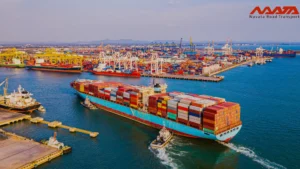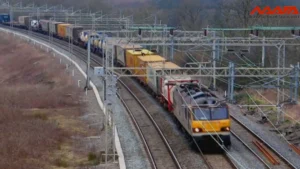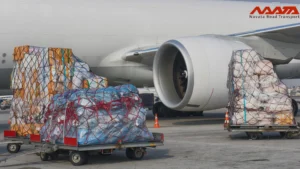What Is Freight Forwarding: Meaning, Process & Types.
Table of Contents
What Is Freight Forwarding?
Freight forwarding is the strategic planning and coordination of the international movement of goods via air, sea, rail, and/or highway transportation. It’s about ensuring your products get from their origin to their final destination safely, efficiently, and cost-effectively. It’s a key component of supply chain management.
Think of it as a comprehensive service that encompasses everything from selecting the best shipping route and carrier to managing all necessary documentation and customs clearance challenges. While a freight forwarder doesn’t physically transport the goods themselves, they are the experts in logistics management, working with a vast network of shipping companies and transport providers to ensure timely and secure delivery.
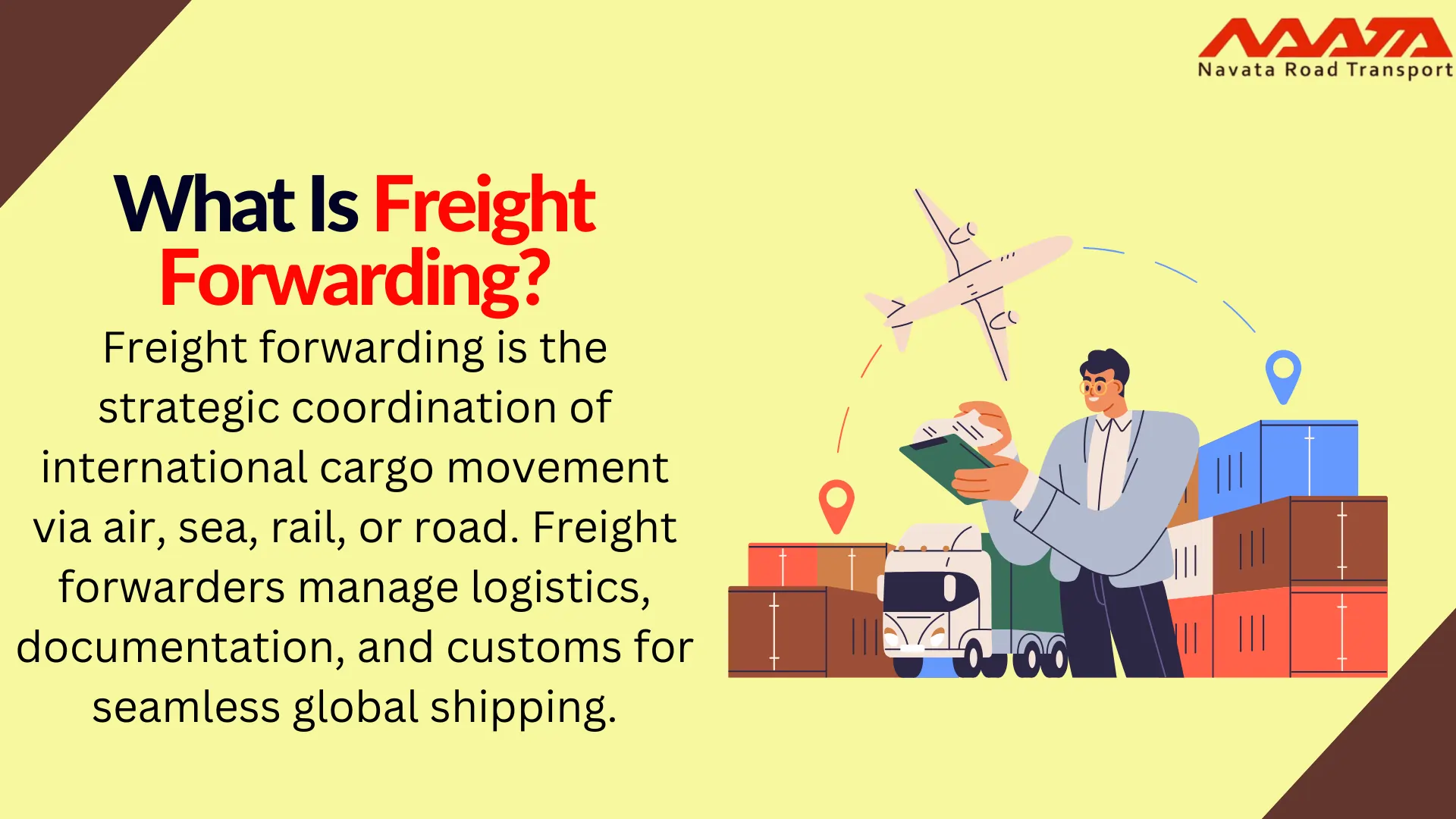
Read More About: Explaining The Freight Forwarding Process – 9 Steps GUIDE
What Exactly Does a Freight Forwarder Do?
A freight forwarder company acts as an intermediary between businesses that import/export goods and the shipping companies that will move them. They are your dedicated logistics partner, handling the intricate details of each international shipment on your behalf. Their core responsibilities typically include:
1. Optimizing Transportation: Choosing the most efficient and cost-effective shipping route and mode of transport (air freight, sea freight, rail freight, or road transport) for each unique cargo shipment.
2. Carrier Management: Selecting and booking consignments with reliable shipping carriers, often leveraging existing relationships to negotiate preferential freight rates and ensure the best shipping solution.
3. Documentation and Customs Brokerage: Managing and submitting all relevant import/export documentation, ensuring quicker and easier customs clearance. Many are also Authorised Economic Operators (AEOs), benefiting from simplified customs processes and avoiding delays.
4. Warehousing and Storage: Arranging any necessary warehousing solutions during the shipment’s journey, from origin to destination.
5. Shipment Tracking: Monitoring your cargo every step of the way and providing regular updates, often utilizing advanced Transportation Management Systems (TMS).
6. Cost Optimization: Advising on and optimizing various costs, including freight charges, documentation fees, and customs duties, to provide the most affordable shipping options.
7. Cargo Insurance: Offering comprehensive cargo insurance, often with advantageous conditions and competitive premiums, and handling claims if needed.
8. Freight Consolidation: Consolidating smaller international shipments into fewer, larger consignments to reduce overall transportation costs and environmental impact.
9. Advisory Services: Providing expert advice on packaging, labelling, loading, stowage, and even supply chain optimization and environmental reporting (e.g., carbon footprint KPIs) for sustainable shipping.
Essentially, a freight forwarder takes on the complex administrative and logistical burden of overseas shipping, allowing you to focus on your core business.
How Does the Freight Forwarding Process Work?
The freight forwarding process is a multi-step journey, meticulously managed by the forwarder. Here’s a typical breakdown:
1. Carrier Procurement: The freight forwarder identifies and selects the most suitable shipping carriers for your goods, negotiating favorable freight costs.
2. Export Haulage: Goods are transported from your company’s location to the freight forwarder’s origin warehouse, often by truck. This is the initial domestic transport.
3. Origin Handling: Upon arrival at the warehouse, goods are inspected, verified against documentation, and checked for any restrictions before international shipment.
4. Export Customs Clearance: The freight forwarder or their appointed customs broker handles the necessary paperwork and liaises with customs agents to get your goods approved for export, ensuring compliance with export regulations.
5. Shipment Tracking: Once the goods are en route, the freight forwarder continuously monitors their progress and keeps you informed of their whereabouts. This provides vital supply chain visibility.
6. Import Customs Clearance: Upon arrival in the destination country, the goods undergo another customs inspection. The freight forwarder manages this process, including any import duties or fees, to ensure smooth entry.
7. Destination Arrival and Handling: After clearing import customs, goods are moved to an import warehouse, where documentation is finalized, and the shipment is prepared for final delivery.
8. Import Haulage: The goods are transported from the import warehouse to their final destination, completing the forwarding process. This is the final leg of the logistics journey.
You May Also Like To Read: What is Reverse Logistics and It’s Benefits and How It Works
What are the Different Types of Freight Forwarding?
Freight forwarding services are categorized primarily by the mode of transport used, each with its own advantages depending on urgency, cost, and cargo type:
1. Air Freight Forwarding: Ideal for high-value, time-sensitive, or perishable goods that need to reach their destination quickly. While typically more expensive, it offers the fastest transit times and high reliability.
2. Sea Freight Forwarding (Ocean Freight): The most common and cost-effective method for large volume or heavy cargo. Goods are transported in containers via cargo ships. This is suitable for non-urgent shipments and offers significant cost savings.
3. Road Freight Forwarding (Trucking/Haulage): Primarily used for domestic transport or for cross-border movements within continents. It offers flexibility, door-to-door service, and is often used in conjunction with other modes (e.g., for export or import haulage).
4. Rail Freight Forwarding: An environmentally friendly and cost-effective option for moving large quantities of goods over long distances, particularly across landmasses. It’s often used for intermodal transport, combining with road or sea freight.
5. Multimodal (or Intermodal) Freight Forwarding: This involves using a combination of two or more transport modes (e.g., sea to rail, air to road) under a single contract. It offers flexibility, cost optimization, and often improved efficiency by leveraging the strengths of each mode. Freight forwarders excel at orchestrating these complex multimodal journeys.
The choice of freight forwarding type depends entirely on your specific shipping needs, considering factors like budget, delivery timelines, and the nature of your cargo.
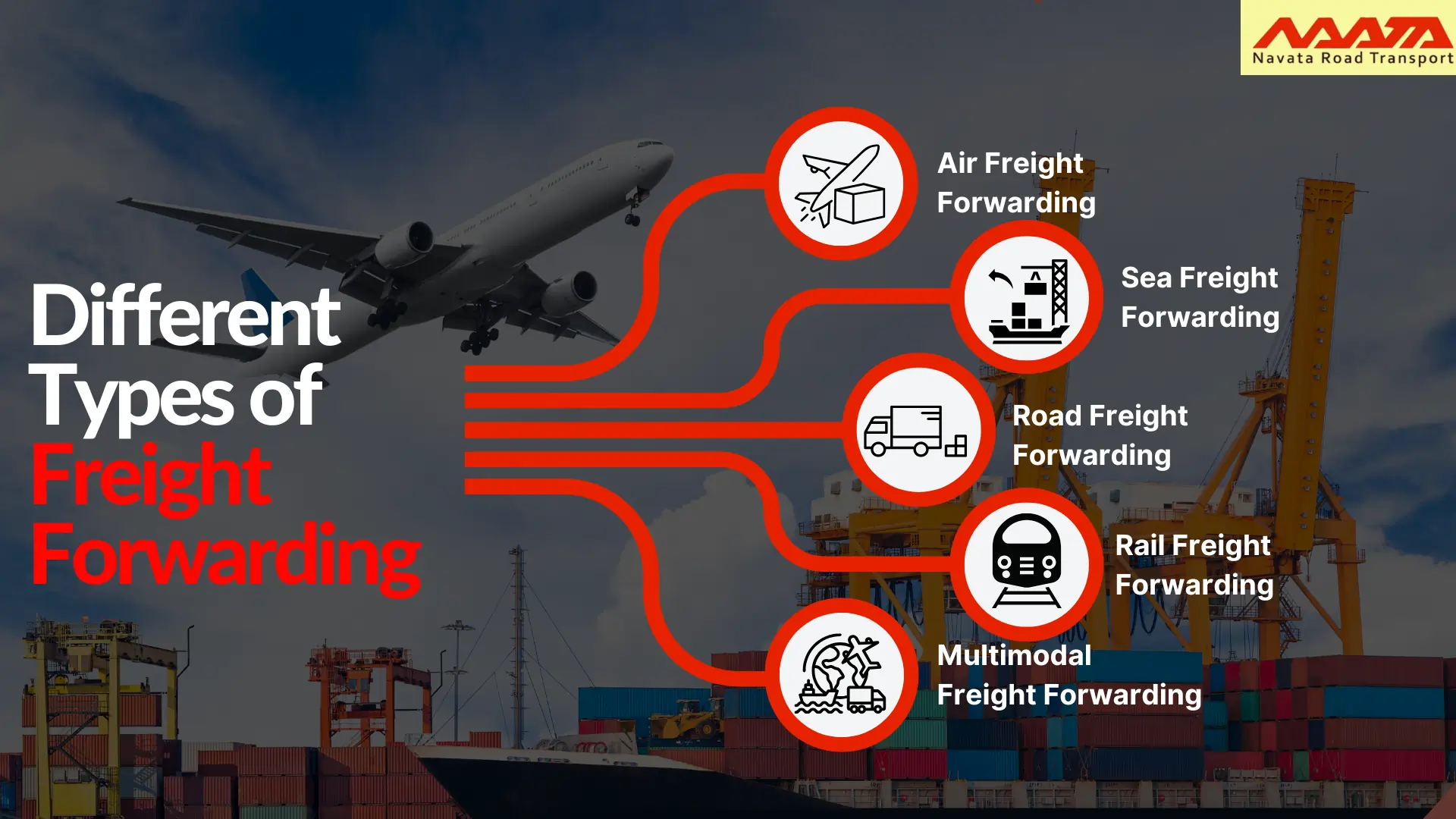
You May Also Like To Read: What is International Shipping and How it works?
What are the Key Benefits of Partnering with a Freight Forwarder?
Working with a freight forwarder offers significant advantages for businesses engaging in international trade and global shipping:
Reduced Costs: By consolidating shipments and leveraging their network, freight forwarders can secure better freight rates, leading to substantial cost savings for your business.
Improved Efficiency and Time Savings: They streamline the entire shipping logistics process, from documentation to customs, freeing up your internal resources.
Quicker, Easier Customs Clearance: Their expertise and potential AEO status simplify customs procedures, minimizing delays and potential fines associated with international shipping regulations.
Simplified Billing: You deal with a single invoice from your freight forwarder, rather than managing multiple suppliers for your logistics needs.
Lower Administrative Workload: They handle all the intricate paperwork, storage, and transport solutions, significantly reducing your administrative burden for global transport.
Enhanced Reliability and Certainty: Leveraging their trusted networks and experience, they provide a battle-tested and streamlined process for reliable shipping.
Proactive Risk Management: Experienced freight forwarders have strategies to mitigate risks, including offering comprehensive cargo insurance for your valuable goods.
How Do You Choose the Right Freight Forwarder for Your Business?
Selecting the right freight forwarder is crucial for successful international shipping. Consider these key questions:
Does their expertise align with your needs? Ensure they can handle your specific cargo types, volumes, and destinations, offering specialized shipping services if required.
Do they have well-established networks? Look for strong global and local connections with shipping lines, airlines, and trucking companies.
What is their approach to risk management? Inquire about their strategies for handling issues and their cargo insurance options for various shipment types.
How do they communicate? Prioritize transparency, timely updates, and responsive communication channels for your logistics operations.
What services do they provide? Confirm they offer all the services your supply chain might require, from multi-modal shipping to specialized warehousing and distribution.
How flexible are they? A good freight forwarder can quickly adapt to unforeseen changes or challenges in global transport.
Do they have the relevant licenses, certifications, and permits? Verify their compliance with all necessary shipping regulations and industry standards.
By carefully considering these factors, you can find a freight forwarder who will be a valuable asset in optimizing your global supply chain and ensuring your goods reach their destination seamlessly.

Thank You For Reading: What Is Freight Forwarding: Meaning, Principles & Types.
Powered By 360Presence
